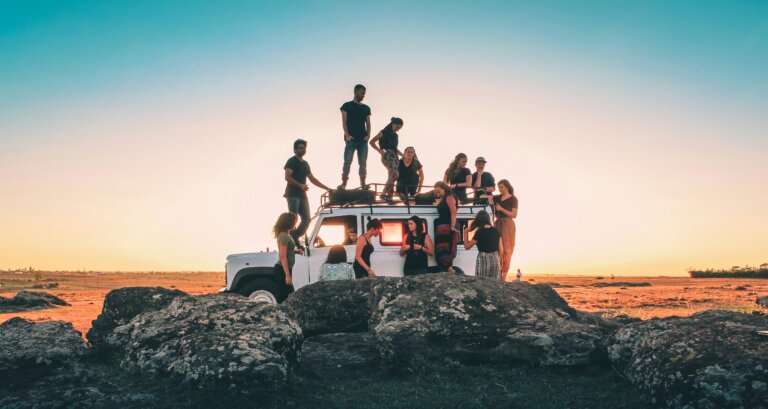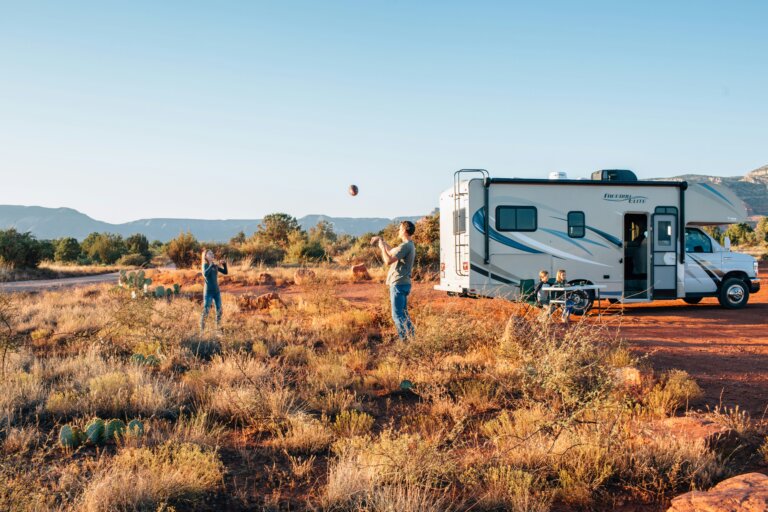Menu
Circular economy, collaborative consumption
and vehicle sharing...
A new way to live, consume and travel!
Welcome to an era in which sustainability, collaboration, sharing and now the exchange of leisure vehicles are becoming the pillars of our lifestyles and consumption patterns. This evolution is part of the broader framework of the circular economy, collaborative consumption and the sharing economy, forming a dynamic ecosystem that is redefining our relationship with resources and our environment.
Circular economy: the foundation of a sustainable transition
At SwapTheRoad, our ambition is to enable leisure vehicle owners to travel at a lower cost! To achieve this, we believe in a modern, sustainable approach to travel, based on conviviality, sharing and preserving our planet. Our platform offers you a unique opportunity to experience unforgettable adventures while actively participating in collaborative consumption.
Key principles of the circular economy:
- Resource regeneration: restoring and renewing natural resources to preserve their long-term availability.
- Circle economy: promoting reuse, recycling and recovery to minimize waste production.
- Sustainable design: designing products to extend their lifespan and facilitate recycling.
- Collaborative partnerships: encourage collaboration between industry players, governments and civil society to create effective circular solutions.
Collaborative consumption: a pillar of the circular economy
Collaborative consumption fits naturally into this approach, emphasizing sharing and maximizing the use of resources. It has emerged as an intelligent response to the challenges posed by over-consumption, promoting more efficient use of goods and services.

Integrating the principles of the circular economy into collaborative consumption:
- Resource sharing: collaborative consumption reduces the need for individual possession by promoting the sharing of under-used goods, thus aligning its practices with the reduction of waste.
- Sustainability: by promoting the efficient use of resources, collaborative consumption contributes directly to sustainability, a fundamental pillar of the circular economy.
- User-centered design: collaborative consumption platforms often encourage the design of sustainable products and the creation of solutions that extend the life of shared goods.
Sharing economy: a sustainable ecosystem
Sharing economy, complementary to collaborative consumption, extends the scope of these practices to various sectors of our daily lives. From transportation to accommodation to collaborative work, this approach promotes the optimal use of resources while strengthening social connectivity.

Social and environmental value creation :
- Shared mobility: carpooling and car-sharing services reduce the need for individual car ownership, thereby minimizing carbon footprints.
- Collaborative accommodation: accommodation platforms promote the existing use of accommodation, offering sustainable alternatives to traditional lodgings.
- Flexible working: the sharing economy extends to work, enabling individuals to use their skills flexibly, creating a balance between market demand and available skills.
Recreational vehicle exchange: a new sharing horizon
Integrating recreational vehicle exchange into this dynamic represents an innovative step. Instead of owning vans, motorhomes or caravans that often remain unused for long periods, this practice enables owners to temporarily exchange their vehicles with other members of the community, maximizing the use of this equipment.
- Optimal use of vehicles: temporary exchange optimizes the use of these costly assets, putting them in the hands of people who need them without the need for permanent ownership.
- Widening accessibility: owners can access different types of leisure vehicle according to their specific needs, expanding the possibilities for travel and adventure.
- Reduced environmental impact: by avoiding the overproduction of new leisure vehicles and favoring existing use, this practice helps to reduce the carbon footprint associated with the manufacture of new equipment.

Challenges and opportunities: towards an ethical evolution
While these models offer considerable advantages, challenges remain. Issues of privacy, security and inequality need to be addressed proactively. However, these challenges serve as catalysts for ethical evolution, prompting us to rethink and perfect these models in order to create fairer, more sustainable societies.
With SwapTheRoad: on the road to a collaborative future
By merging the principles of the circular economy with collaborative consumption, the sharing economy and leisure vehicle exchange, we are charting a course towards a future where collaboration, sustainability and resource efficiency are at the heart of our interactions. These models are redefining not only the way we consume, but also our relationship with resources and our planet. As we embrace this transition, we are helping to shape a world where sharing, trust and collective responsibility are the pillars of a more equitable and resilient society for generations to come.
Travel differently
with SwapTheRoad!
Consume differently, share what already exists
The sharing economy reduces the need to produce more…
Don't buy,
don't rent, exchange!
Why should we buy or rent what we can borrow?
No more shipping your vehicle across seas & oceans
Reduce your carbon footprint by cutting down on shipping
Support small
local shops
Share your good addresses with the SwapTheRoad community
Practice Slow Tourism
every day
Travel longer & slower to consume less…
Support and promote responsible road trip
Be respectful of nature and share your best practices
Practice a tourism more :
DURABLE :
Temporary vehicle exchange is part of the sharing economy!
RESPONSIBLE :
We promote slow tourism and support local shops!
HUMAN
More than our vehicles, we share our experience, our advice, our tips and our kindness!

